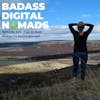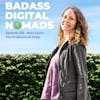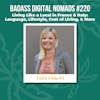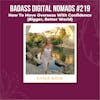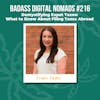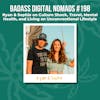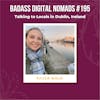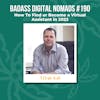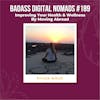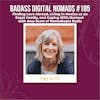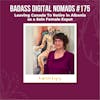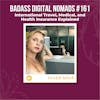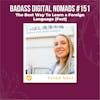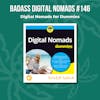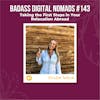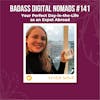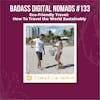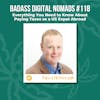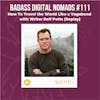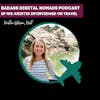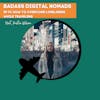Bridging Borders: A Ukrainian Family's New Chapter in Poland

Hear the inspiring perspective of Olga Pylypchuk, a Ukrainian refugee and digital nomad currently living in Poland with her mother and younger sister, while her father and teenage brother are still living in Ukraine.
Hear the inspiring perspective of Olga Pylypchuk, a Ukrainian refugee and digital nomad currently living in Poland with her mother and younger sister, while her father and teenage brother are still living in Ukraine.
Learn how she’s traveling, working remotely, and coping as a family who’s been directly affected and separated by the war. Plus, Olga and Kristin share the best ways you can support Ukraine from anywhere in the world.
The war in Ukraine is still very real and people need our help every day. Let’s keep spreading the word and do what we can to help Ukraine get through this! Resources are listed below.
SPECIAL OFFERS:
- Donate directly to Ukraine via Red Cross or UNHCR (if you are in the US, click here)
- Other ways to help Ukraine: SupportUkraineNow
- Subscribe to Kristin's weekly e-mail list
- Do you want to Travel with Kristin in 2024? Fill out our new destination poll, here.
Topics Discussed:
- What life in Ukraine was like before the war
- The culture, history, and food scene of Lviv, Ukraine
- How Olga’s family is adapting to life during the war & Why they separated
- Remote/freelance work for Ukrainian refugees
- Living and studying abroad in Poland
- Learning Polish as a young Ukrainian refugee
- How Poland is supporting Ukrainian refugees
- How Ukrainians are coping with the war
- Where Olga’s been traveling as a digital nomad
- The best ways to help Ukraine (from any country)
Questions Answered:
- How have you been affected by the war as a Ukrainian citizen?
- How do you support yourself with remote work?
- What is it like to study abroad and live/work in Poland?
- How has your family coped with the war in Ukraine?
- Is your social network different after moving to a different country?
- Are there strong Ukrainian communities in Poland? How are they doing?
- How often are sirens going off in Ukraine in 2023?
- How do you envision your future? Would you move back to Ukraine?
- Do Ukrainian men have to join the military or can they still work their regular jobs?
- and more!
Episode Resources:
Recommended Videos:
- I Asked Digital Nomads How They Make Money Living On A Remote Island 🏝
- Asking 10 Digital Nomads How They Make Money Online from an Island
- Digital Nomad Life in Krakow, Poland: Cost-of-Living, Apt Tour & Vlog
Related Podcasts:
- Being a Global Citizen with Russian-American Digital Nomad, Vlad Glebov
- My Thoughts on the War in Ukraine and How To Help (from 2022)
Digital Nomad Resources Mentioned:
See the show notes pages on BadassDigitalNomads.com or TravelingwithKristin.com/podcast for more details.
Olga: 00:00:00 This is the way how my parents raised me. So they were telling me all the time that traveling is the most important thing, you-- It's like you don't need fancy car or fancy apartment. All you really need is traveling. And I'm really happy about that, that now at this person who loves traveling and exploring the world, and this is because of my parents, actually,
Kristin: 00:00:25 I'm gonna cry
Introduction: Welcome to Badass Digital Nomads, where we're pushing the boundaries of remote work and travel, all while staying grounded with a little bit of old school philosophy, self-development, and business advice from our guests.
Kristin: 00:00:47 Hey there, Kristin Wilson from Traveling with Kristin here, and welcome to episode 226 of Badass Digital Nomads. Today I'm very pleased to welcome our guest, Olga Pylypchuk from Ukraine, who is currently living in Poland and joined by her mother and her younger sister while her father and her brother remain residing in the Ukraine. And I wanted to have Olga on the podcast ever since I met her last year in Madeira, Portugal, when I was there for the Nomad Island Fest. I interviewed her for one of my YouTube videos about how digital nomads make money online. And we were also, you know, talking about how she was traveling and working remotely and living abroad as a Ukrainian who had been affected directly by the war and the Russian invasion of Ukraine. And so we were able to make it happen, and I just really wanted to hear from her and her words from her perspective, how she's been affected by the war, how her and her family have coped with this, and also how many stories that she shared of Ukrainians at home and abroad, and how they've been coping with this.
Kristin: 00:02:12 It was just very touching and, and emotional and also inspiring to talk with her. And just ma really made me think a lot and reflect a lot on life in general. And even though the war in Ukraine has been out of the news as much as it was at the very beginning, it is still very real. And people need help and they need help every day. So we're going to link in the show notes with all different ways that you can help. And then Olga will also recommend some ways at the end of the podcast. So we don't have any sponsors for today. I'm not sharing any other brands or products or affiliate links with you. I just really wanted to focus on this cause and try to help as the Badass Digital Nomads community in any way that we can. So as Olga mentions, one of the best ways is to spread the word about what is happening and that it continues to happen.
Kristin: 00:03:20 So sharing this podcast and, and stories of real people and real families to kind of counteract or balance out, you know, some of the negativity out there in the media. And also donations are very important, very effective, and very welcomed. So regardless of where you live in the world, the Red Cross is one place that you can donate as well as the UNHCR, the United Nations, uh, Refugee Agency, and also directly through your government. So through your local or national government. I believe most countries have some kind of program where you can either register your interest to help or volunteer or donate or contribute in some way. So definitely check the show notes out for options there. And I hope you enjoy my conversation with Olga.
Podcast Interview:
Kristin: Welcome Olga to Badass Digital Nomads. Where are you joining us from today?
Olga Pylypchuk: 00:04:25 Hi, Kristin. Right now I'm in Poland, however, I've just came back from Ukraine on Thursday I was there and now I'm in Poland.
Kristin: 00:04:35 Oh, how long were you there for?
Olga: 00:04:38 I was there for, uh, three weeks, I guess. I went there for a week and a half, but I stayed longer because my brother, he's 16 and he wanted me to be there because we have haven't seen each other like for eight months. So he, he really missed me and as I, I work remotely, so, so I could stay.
Kristin: 00:04:58 Yeah. Do you have other siblings or just one brother?
Olga: 00:05:02 I have sister as well. She is younger. She's 13. She's staying here in Poland.
Kristin: 00:05:07 Oh, so is she with you?
Olga: 00:05:09 Yeah, she is with me and my mom. And my brother is with my father in Ukraine. He can leave, but he is football player, so he decided to stay in Ukraine because because of football and it's easier for him to build career there than somewhere abroad in this stage.
Kristin: 00:05:27 Oh, okay. And where are you from in Ukraine? Can you share a little bit about your background and kind of what your life was like before?
Olga: 00:05:37 Yeah, actually I'm from Lviv. It's, uh, really close to Polish border in general. It's one of the safest places right now in Ukraine. However, there are still attacks and, uh, almost every day, like alarms Yeah. And sirens. And even when I was actually coming back this time, this was the first time when I heard explosions. Yeah. I was going to the border to cross it to go to Poland. And my, my father was giving me a ride and yeah. And we heard three explosions and it was really scary. And yeah, I think I felt like what is real fear <laugh>? I never felt that before. So I cannot imagine people who, who live, for example, in Kyiv or Dnipro or other cities which are bombed every day.
Kristin: 00:06:32 No, I, I don't know. I can't even imagine what that would be like. I've never heard that. I mean, you know, even hearing, uh, when traveling like a cannon or something go off, I mean, even that sound is unnerving when you know that it's just for the show. So I can't even imagine. But I have heard that Lviv is a beautiful city and it was high on my list of places to go, actually before the pandemic started, so I haven't been able to go there yet. But what is it like there or, you know, what was it like growing up there and kind of the culture and the atmosphere of, uh, being in that city?
Olga: 00:07:13 Yeah, Lviv is amazing. So it's my hometown, so I love it. And I think because of that, I really love the old cities with history because, uh, Lviv has a lot of history and, uh, and it's pretty interesting because it, uh, used to be under different countries and culturally it was developing in different ages and all of that, all of this culture of the history, uh, has a huge impact on, on the city. You can see there are a lot of cultures, a lot of people, like, there are a lot of minorities like Polish minorities, Jewish minorities, even, you know, even before the war there were Russian minorities and everyone, everyone was like living in, uh, in a good atmosphere, let's say. So, and, and right now it's, it's a bit different. But however, we like this culture of restaurants of, uh, drinking coffee, and even during pandemic, when all around the world, the restaurants were closing in Lviv, they were opening new because people so got used to like eating out.
Olga: 00:08:32 So they were just like, you know, taking away food and sitting near the restaurants on benches or even like, you know, in the sidewalks <laugh> and having lunches or, or drinking coffee. So it was really amazing during pandemic and it was, uh, interesting experience because for example, here in Poland, everyone was staying home and in Julia, yeah, obviously there were some restrictions. There was a lockdown where people managed to, you know, to or either to go, you know, to make drive to take a coffee and stay at car and, and drink coffee or eating something <laugh> because the restaurants were closed. But people still had this, and still have actually this culture of, of eating out and especially drinking coffee because we say that Lviv is the city of coffee because of actually Austria culture, because historically Lviv was under Austria for, for a pretty long time, and the culture of drinking coffee is actually from there. And there's like Vien Coffee and it's actually started from Lviv.
Kristin: 00:09:42 Oh, wow. So like the Viennese coffee and cake.
Olga: 00:09:47 Yeah, something like that because like, not, not cake, actually only coffee, but uh, it's still, you know, it was like over a hundred years ago, this impact, but it's still there in view and it's, it's pretty interesting. Oh,
Kristin: 00:10:02 I love that.
Olga: 00:10:03 When, uh, I moved to Poland when, uh, I was 17, so it was like 13 years ago, just after I graduated high school. And I studied in university in Poland. So for me it was like big cultural shock that people here, they, uh, wouldn't drink coffee. Now it's like, uh, the, there are like some, uh, coffee shops in restaurants, but back then no one was doing that because I live here in a small town. And for me it was real cultural shock because I couldn't imagine that how, you know, how you can't understand like culture of drinking coffee, some in some nice place.
Kristin: 00:10:42 And which town are you in now in Poland?
Olga: 00:10:45 It's Jaszów it's also pretty close to Ukrainian bo-border. It's like the, the nearest big city is Kraków.
Kristin: 00:10:53 Okay, okay. I've been to Kraków. Uh, yeah, that's definitely a big shock. Um, what are some of the popular foods that people eat in Lviv? Like what can you find in the restaurants there?
Olga: 00:11:06 We have a lot of cool restaurants. You can find there almost everything, and they're still opening new ones. The last one which I visited was Korean food restaurant where you can
Kristin: 00:11:20 Oh, Korean barbecue. Yeah,
Olga: 00:11:22 Yeah, yeah. Korean barbecue. And it was like really awesome experience. So you can find there almost everything. Obviously you can also find like traditional food, which, uh, I do recommend to travel when you're traveling to Ukraine for the first time. So it's Borscht traditional food, it's like beetroot soup, also some Ukrainian dumplings and pancakes where we don't do pancakes like in the US like, like these round ones we do is like really sane. Then we put there some cheese or some cream and then we like cover it inside and eat like that.
Kristin: 00:11:59 Oh, okay. So it sounds like mostly savory foods Yeah. Are more popular there. You don't dump liquid sugar on top of your pancakes, like Americans stew. Yeah.
Olga: 00:12:09 Yeah. We put it kind of inside, so <laugh>.
Kristin: 00:12:13 Okay. And so you lived in Poland, going to university there. Did you move back to Ukraine after school?
Olga: 00:12:21 No, I started my career here in Poland. And then when pandemic started and we all started working remotely, I went to visit my parents and then I planned to stay there like for a week or two, and I stayed for over than a year. Oh. And actually I was planning to move back to Ukraine, but then this, the divorce started and my mom and my sister come back, like moved here to, to Poland. So I stayed with them. Surprisingly, like even for me it was like a big surprise how developed Ukraine was like two years ago because I wasn't living there for like 10 years. And for me, it's like, in my mind, which I'm kind of ashamed right now because of it, that Ukraine was like this low developed country, to be honest. Like a lot of people think that, you know, it's not European at all.
Olga: 00:13:23 But it was my real mistake because I didn't know how developed it was because during those 10 years, Ukraine started developing very fast, especially because of IT sector. It's actually one of the strongest in the world. And I was really surprised when I moved back because of like banking system because of like electronic IDs. Ukrainians, the first country in the world, which actually started using like electronic IDs in your phone. So you can do everything, all government offices, all uh, like medical system, you can have everything in your phone. It's like your ID and you go to any government office and they, they respect it.
Kristin: 00:14:07 Wow. It's kind of sounds like Estonia being a very digitized
Olga: 00:14:12 Yeah. This is the same method. So it's really cool.
Kristin: 00:14:15 And what do you do for work now to support yourself? You're still working remotely?
Olga: 00:14:20 Yes. I work remotely. I do both. Uh, like I have my full-time job, I do freelance as well. I'm working for big tech company, which is international, but I also do some freelance for Ukrainian companies. To be honest, I don't charge them much because those are startups and I know without any funding. So I just want to help them to, because I do marketing and I just want to help them, you know, to apply my knowledge and my experience because it's really hard right now, especially in retail, in Ukraine to set, you know, because, because of the situation, because you don't know what will happen tomorrow, will, will people have money, but still small business has to grow because this is what helps the economy. So this is why I like doing freelance, uh, for small Ukrainian startups, just to help them to develop their businesses.
Kristin: 00:15:21 Yeah. So you're doing marketing mostly?
Olga: 00:15:24 Yeah,
Kristin: 00:15:24 Yeah.
Olga: 00:15:25 Yeah. So actually my story that I've started from doing Facebook ads right now, there is no Facebook ads any longer. There's meta
Kristin: 00:15:35 <laugh>. Yeah,
Olga: 00:15:37 I still do that. But I also do like strategy email marketing. So like, like bigger scope of that. What's funny, I do digital only because I tried myself in offline marketing and it's like completely different story. So I was like, no, <laugh> I prefer, yeah, I prefer online.
Kristin: 00:15:58 How has it been for you acclimating to life in Poland? Do you feel like since you went to school there that you, you know, really blended in with the culture? Or how has this move to study abroad in Poland? And then also, you know, having your mom and your sister there with you, how has that affected your experience?
Olga: 00:16:21 Yeah, I think I assimilated with Polish people pretty fast because it's actually pretty similar culture. Obviously we have a, a lot of differences, but still it's, it's similar than some, I don't know, like countries from Asia right. Or, or even the US. So it's, it's close. So we have pretty similar languages. So we have, uh, some similarities in food, in culture. We have, uh, we share some history. So it wasn't that difficult. I was 17 when I, I moved, so when you're a kid, because 17, it's still a kid. <laugh> now that I realize that I guess it's easier. You don't think that much. And the good thing that for, for a year I moved to Ukraine to my parents' house because we stayed all together because my, my parents have like pretty big apartment in the city center of view. So we managed some routine and we managed to live together. And when my mom, uh, moved to my place, it was really hard because I have small apartment but luckily we already had that experience, right. So because of that, that we, we lived together for some time, it was easier and I couldn't imagine that, how it would be if I hadn't moved to Ukraine before so
Kristin: 00:17:44 Right. In a weird way, COVID kind of helped even though that was a hard time for everyone, but kind of gave you a, a crash course in, in living together with your family. And, uh, and how are they adapting to life in Poland? Of course, your sister is younger, but you, has your mom lived in Ukraine her whole life?
Olga: 00:18:07 Yes, she has. And I think she is adapting very well because she was kind of this housewife who keeps house in good condition and takes care of kids. And sometimes if she earns some money, it was because of hobby, because she is like, she does a lot of handmade, but it, it was just her money. So she, she didn't care about this part of her life. My, my dad was taking care of, of financial. Financial finance.
Kristin: 00:18:36 Financial <laugh>.
Olga: 00:18:38 Yeah, <laugh>. And uh, now when she moved to Poland, she actually started working. She's working at, uh, preschool because she has actually, she's a teacher and I see how she's developing herself in her fifties and she's kinda got her second life. Wow. Yeah. And I'm really happy for her. And now they are planning to move from my place. So they are looking for, for a flat. And this is amazing because she kinda like, I don't want to say that she became an adult, but she became like more, she, she changed her life completely. And I even see that now when, uh, my father and my mother live in, uh, in different cities and even different countries. So they, they have better relationship because, you know, they've been together for over than 30 years. That's like a lot. And now they're like, really? They, they're really nice couple and like, they call each other almost every day.
Olga: 00:19:48 They talk a lot. So it's like really amazing to see how, how they're doing. Yeah. And my sister, she's still like pretending that she doesn't like it here, but it's like, you know, she's, uh, uh, she's teen, so <laugh> uh, so teenagers always, uh, behave like that. So she says that she, she doesn't want to be here, but she has a lot of friends now. She, she started studying pretty well because she, when she went to the school, like in Ukraine, she was average. However, when she moved here, she didn't want people to think that she's worth worst, that she's like, you know, not smart enough because she's a Ukrainian or something. So she felt maybe, I dunno, like a bit ashamed or I, I even don't know why, but she wanted to show that she's like super smart. And so she started studying like really hard and now she has almost all marks like A plus.
Kristin: 00:20:50 Wow. <laugh>.
Olga: 00:20:51 Yeah. Yeah. It's like five and six here in Poland. So it's like really amazing. And she, she's like studying a lot and, and she likes the most important things that she enjoys that. So, so yeah, it's like completely different life for them here.
Kristin: 00:21:08 And do you all speak Polish? Is she going to school in Polish?
Olga: 00:21:12 Uh, yeah, she's going in school in Polish. No, she learned it here. Wow. So my mom, uh, she used to speak a bit because they, uh, they, they would often travel here to Poland. So she, she knows basics and she learned pretty good, I think like B two now. She has like B two level of, of Polish and yeah. And my sister learning from zero, she has, uh, really good teachers because when we sent her up to the school, we ask teacher, do we need to hire some tutors for her, her or something? And the teacher was like, no, no, no. If she's a kid, she will get the language like really fast. So she has just, you know, to have a proper vocation and to relax and then like, we'll help her. And this is what happened. Now her polish is even better than mine. Wow.
Kristin: 00:22:04 Wow.
Olga: 00:22:05 So she, yeah.
Kristin: 00:22:06 And how long have your mom and sister been there so far?
Olga: 00:22:10 So it's over than a year. So they moved here, uh, in March, 2022.
Kristin: 00:22:18 Wow. That is so inspiring. I know how hard it is to learn a new language. So when I was living in Costa Rica, I couldn't imagine going to school, you know, going to college or high school in Spanish. I think that would be difficult. But I guess if you are fully immersed there and everyone around you is speaking that language, it helps you learn faster.
Olga: 00:22:39 Yes. Yes. I think so.
Kristin: 00:22:41 And how has the, uh, Polish government and society welcomed Ukrainians? I, I read that that was one of the top countries that people went to when the war started. Are they giving people unlimited time to live there? Are they giving everyone work visas? Are there any kinds of programs for refugees from Ukraine?
Olga: 00:23:04 Yeah, there, here's like a program for refugees, and now they prolong it, I think for one year, because it was supposed to be till August this year. And now they prolonged it, I, I guess for a year. So, um, refugees can stay here during this time. They can leave Poland only for 30 days. So this is the, the rule, let's say. But they can have all rights, almost all rights as Polish people. Obviously they cannot vote, it's logical, but they, they can like, you know, establish a company here, they can have medical care. So it's pretty good. Yeah. And yeah, at the beginning, Polish people really opened their hearts, I would say for Ukrainians. Uh, they were helping a lot, even at my work, because we used to have like this huge office, so they opened one floor only for, for refugees. Like workers brought a lot of, you know, stuff like, I know, like even beds or clothes and food for refugees.
Olga: 00:24:15 And also, uh, like at the beginning, you know, everyone was shocked and stressed, so, uh, I couldn't work properly. Like, I couldn't focus on my work. So my boss told me that it's fine, I can take as long as I, I have to. And when I went for the first time to Ukraine, it was in April last year. So, uh, the company said that if something happens or, you know, there will be alarms or I don't know, like lack of electricity or something else, they, uh, wouldn't count as, as a day off or like, like it is like normal day. So they will not charge me for, for that. So it was really amazing. So they said that they couldn't imagine that i, I would take, take off because of this situation,
Kristin: 00:25:02 So. Right, right. Yeah. And do you feel like there's a big Ukrainian community there? Like are you very well connected with other people from your country? Or is your social network more of people of different countries or from Poland?
Olga: 00:25:20 Yeah. My, my social network is actually different because like, first of all, I've been living here for, for a lot of years, and also I'm traveling a lot. So yeah, I have friends all around the world, but I think Ukrainian communities here in Poland are pretty big. And it's, it's interesting to see how people actually, uh, making businesses here, have some businesses from Ukraine are moving here to Poland or to other countries. It's amazing to see how people can deal with such terrible situation. And, but I guess like we can get used to everything. This is our nature, like people's nature. Yeah,
Kristin: 00:26:02 Yeah. Humans are very adaptable and the most dire of, of circumstances and the most challenging as well for the people that are back in Ukraine. How did your family come to the decision to separate and have your dad and your brother stay there and your mom and your sister go to Poland? Was that a very difficult decision and, you know, what kind of factors did you consider in that? Or your parents
Olga: 00:26:31 Yeah, for my father, he just simply cannot leave the country because he is 52. When you are between 18 and 60, you cannot leave. And at the beginning, my brother, uh, he moved to my place as well. And, uh, the very first thing which I did, I found, uh, a football team for him. And he started like trainings. However, it's really hard, you know, he's in this age 16 when he's starting his career, and it's like time when you have to be smart about the decisions. And for a foreigner, it's really hard to start playing professionally before 18. It's more almost impossible. And it's like in, in each country of European Union that you can only start when you, uh, playing professionally when you are, uh, over 18. And, you know, in this age, the time is really valuable. So it was his decision to move back to my father, to Ukraine, to play for his team, because like, we also went with him to Austria.
Olga: 00:27:48 He had trainings with Austrian team, so he had the choice to stay in Poland or go to other country where he decided to, to move back to Ukraine because obviously has more chances to start his career there than abroad. And I think it was a good decision because actually a week ago he had his first professional team, uh, game for a professional team. Wow. Yeah. And he already signed his first professional contract. Yeah. So it was hard decision, especially for my mom, because my, my dad, to be honest, he was happy because for, uh, six months he, he was alone and it was really hard for him. So my brother moved back to Ukraine to play, uh, football or soccer. My mom stayed here because of my sister, because it's better for her to be here when it's like, when, when she doesn't hear all the sirens and when she has like, proper school.
Olga: 00:28:54 because you know, when there are sirens and these alarms, you, uh, everything is closed, like school are closed, you have to go to shelter, and you know, it's like you don't have proper school day. So for her mental health and for her future, they decided to stay here. So yeah, it's not easy for them to be separated, but I think my parents, um, like made a good decision for, for everyone. Yeah. So they kinda, you know, they're doing this for kids, so if my brother decided to stay here, my father would accept it as well, because this is what my parents are doing actually for all their lives. They are like doing, uh, the, they try to do the best for their kids. For example, I, um, I'm really happy that my parents showed me the, actually the way I live now, because they, they, uh, showed me traveling.
Olga: 00:29:54 They like, since I was, I guess seven or even six, yeah. When I was seven, my, my father took me with him to the United Kingdom. This was my first big trip, let's say. My mom couldn't go because of the visa. So, so we, we went together and it was really amazing. And then we traveled a lot. And even when I was studying, I went to AIESEC internship to Brazil. I was really like, I was scared to go there, and I wasn't sure. So I called my dad, and he, he asked, I hope that he would say no, <laugh> <laugh>, because I had to ask him money. And it was like a huge, like, for, for them it was big amount of money. And he asked me what I, I was afraid about. And I was like, you know, it's like Brazil, the, the other, other part of the, the world. And he was like, what do you need? I was like, money. And he's okay, you can have it. <laugh>. Oh, and this is the way how my parents raised me. So they were telling me all the time that traveling is the most important. Thank you. It's like you don't need fancy car or fancy apartment. All you really need is traveling. And I'm really happy about that, that now I this person who loves traveling and exploring the world. And this is because of my parents, actually,
Kristin: 00:31:24 I'm gonna cry. <laugh>. <laugh>. That's so beautiful. <laugh>. And is your dad working back in Ukraine?
Olga: 00:31:32 Yes. Yes. He is also working in, uh, this is why actually my brother is like soccer player because he's working in soccer team. It's, uh, Karpaty Lviv. He is, um, a journalist. So he's responsible for PR part for all like press releases, conferences, and this kind of things. So he has been working in, uh, football area for all his life. So he, he really likes it. And yeah, and when all of this started, he also wasn't sure what what's next, because there were no matches, no, like football events, no events at all. So yeah, for some time actually I was supporting my family a lot. Uh, but yeah, now he's back to work. Now. Uh, all events are, are again, there are matches. There is, there is league. So yeah, he has work. Yeah.
Kristin: 00:32:29 That's so inspiring how everyone is just, you know, continuing with their lives as usual, even though there's sirens going on during the days. Do you know how often they have those kinds of warnings?
Olga: 00:32:45 It depends on, uh, on the city and, and the parts of the country. Like in Louisville, it's, I would say each few days, like, uh, each three or four days. Sometimes it's every day. But I would say average is like a few times a week. However, for example, in ku, there is every day there are all sirens every day. And in my, uh, cave was bombed every day, my cousin leaves there, so it was really tough for him to stay there. But still he is, he has work, so he has to go to work to, to live his life. Yeah. And it's actually amazing how, how people can, can live normal life, to be honest. And what I've seen when I was in, in Ukraine that people kind of started appreciating, uh, life more, a lot of marriages actually, a lot of, uh, my friends are getting pregnant, especially when their husbands are soldiers and they're fighting.
Olga: 00:33:49 So they're, they're getting married and they're having kids because like, they never know what will happen. So they, they try to, to live their best lives as they can. No, when you watch some war movies, sometimes you have these scenes where there's like war buts. You still have restaurants, uh, like different couples are walking and kissing and some, you know, musicians are playing on streets. And this is what I saw in, in Lviv, it's like kind of a movie scene. Wow. But it's real. And the atmosphere there, it's, it's completely different. I never felt it before because it's from one side, it's, it's dangerous. People are afraid, but there's also like literally low in the air, you can feel, have people appreciate what they have. And this is amazing.
Kristin: 00:34:47 Wow. We can all definitely learn from their experience and the strength of the Ukrainian people and, you know, not take what we have for granted and just be grateful every day because nothing is guaranteed, no matter where you live in the world, where you're from, how old you are. so,
Olga: 00:35:05 Yeah. And also, we have this joke that Ukrainians now are the best time managers because, uh, during winter we had this, uh, blackouts that they would turn the light off, uh, during like eight hours or even more during a day. In some cities like Odessa, they, they didn't have electricity for like 48 hours and more. So like in Lviv, they had this shadow where they had like, uh, all shadow one, the, the electricity will be off and when it's on. So it was like four hours. So with, with light, then four without, and then four again with, and people really managed to live with that. So when they had, uh, like electricity, they would like clean, then they would work, that would cook. And even there are jokes then when the lights were like off, like minute, a minute or two later, people didn't know what to do because like there's not according to the schedule, right. <laugh> and yeah. So I don't know because how they managed to do that, because I didn't go to Ukraine during those blackouts. My mom went and she said that it was really hard for her, but for people who lived there, it was normal. It was just, you know, it's like good matter of time management, that's all. Wow.
Kristin: 00:36:31 Oh my gosh. It is hopefully a productivity system that we don't have to adopt worldwide. But yeah, that's, that's quite impressive, especially, you know, having an extra minute or so of electricity. I mean, so much that we take for granted. But I used to live in Nicaragua where blackouts and brownouts were very common. For whatever reason, the electricity would go out. Sometimes it was just natural causes, sometimes infrastructure, sometimes they would turn it off on purpose for different reasons. And I mean, I just didn't have electricity most of the time. And I remember going home and looking for a streetlight. There was one streetlight on my whole entire street. It was a dirt road. And if the streetlight was on, I knew I had electricity, and if it was off, I knew I didn't, and I had to sleep outside because it was so hot.
Kristin: 00:37:25 So I basically had a mosquito net set up just outside on the concrete deck. And I would take couch cushions and just yeah, sleep out there. So fortunately there were no bomb sirens going off, you know, it was just me living in the middle of nowhere in Nicaragua. But yeah, ever since that experience, I just really, uh, appreciated having electricity and, um, you know, even just like daily things that people might not think about. Like your food goes bad. And people in Florida who've been affected by hurricanes or people in flood zones, they know, you know, and when there's no electricity for days, like your food goes bad, but I can't imagine, you know, you don't have electricity for four hours, like four hours on, four hours off. You have to think about, you know, even what food can you put in your refrigerator because it's going to go bad every day. And I think that's something that people probably, you know, don't even think about. I don't know how they're coping with that.
Olga: 00:38:25 Yeah. But like, they got used to it really fast, so Yeah. Uh, it's, uh, yeah, from, it's, it's horrible. But on the other hand, it's really amazing how, how people managed to do that.
Kristin: 00:38:40 Yeah. I would love to hear more of these stories being told in the media and not just the death toll and things, you know, that's, all of that is important as well. But I would love to hear more of these just, you know, personal stories of how people are coping and I think that's, you know, what's the most inspiring. But it's so great to hear that your parents encouraged you to travel, and that's actually where we met was while you were traveling. Yeah. In Madeira last year. How long were you staying in Madeira Island and, and what are some of the places that you've been traveling as a digital nomad?
Olga: 00:39:16 For me, it was only a week.
Kristin: 00:39:18 Oh, okay.
Olga: 00:39:19 Yeah.
Kristin: 00:39:20 I was lucky to meet you. <laugh>.
Olga: 00:39:23 <laugh> in one week. Yeah. Uh, it was really nice. Yeah, I went to that event then as a digital nomad, I went to Berlin. I also met a few people from, from that event we visited together. And then I went to France and Belgium, then back to Poland. And now I'm a big a bit traveling. Like I am staying here for some time. Then I go to Ukraine. But in uh, three weeks I'm going to Bali for a, a retreat. And then after Bali, I'm also coming back here. And then I'm going to Web Summit to Portugal, to Lisbon.
Kristin: 00:40:04 Oh, okay. Wow. I can't believe it's already time for Web Summit again. Is that around November 1st,
Olga: 00:40:11 I guess. November 13th.
Kristin: 00:40:13 Okay. Yeah, I was there last year. It's, it's good fun. Lots of people <laugh>. Yeah. What is this event that you're going to in Bali?
Olga: 00:40:23 It's actually why I, uh, master, I call this like meditation club <laugh>, uh, but it's more about like self-developing and wellbeing. And she is organizing this retreat in Bali. There will be almost all people from that, that club, let's say. So it's very personalized. Uh, so I'm really looking forward for, for that retreat. So we will be like doing a lot of meditation, yoga, going to some monasteries, like meeting like some other people. So I think it's gonna be really, really interesting.
Kristin: 00:41:01 Yeah, that's a great place to do, uh, that sort of retreat and introspection. I actually originally went to Bali for a yoga retreat that got canceled, and so I ended up being there anyway, but it's such a beautiful place. How do you envision your future now? Do you like having a home base in Poland with your family and being able to travel? Or do you see yourself going fully nomadic someday? Or are you waiting to move back to Ukraine? What's kind of on your mind right now?
Olga: 00:41:33 To be honest, I still haven't decided, but I'm happy that I can choose and that I can, uh, travel. Like the, the plan actually is to travel, like road trip through Europe, probably to go from Poland to Portugal, like through like a lot of different European countries, like staying there for a few days or a few weeks. Uh, why car? Because I have a senior dog. I cannot, uh, fly with him. So, but I want to travel with him. So now it's Europe, and then I'll see. So I'm not sure if I want to do like, full-time, uh, nomadic lifestyle 'cause I like to have like a base where I have all my stuff when I feel safe, when I know if something goes wrong, I always have place to, to come back to. But yeah, I want to try, uh, nomadic lifestyle as well. So I call it kinda halftime <laugh>, uh, nomadic life. Yeah. So first this destination, and first like big nomadic trip is Europe for a few months. And then I'll see,
Kristin: 00:42:55 I remember meeting a few other people, all women of course from Ukraine who were in Madeira either traveling or living there when I was there. Have you met other Ukrainian remote workers during your travels? And do you feel like, uh, there's a big population of people working online in different countries?
Olga: 00:43:16 Not that many, to be honest, but I feel that a lot of people who can work, like, who have well-paid jobs, let's say, let's say in this way, they're staying in Ukraine because they want to support the economy. And, and I really know a lot of people who can work remotely or are working remotely for companies from, I know like Germany, Switzerland, uh, United States, but they're still staying in Ukraine because it's their homes. They go traveling a bit when they can. But they, they are almost all of them right now in Ukraine. And there are a lot, there are a lot of different reasons because some cannot leave. They are men. Some women don't leave because of their partners or they just simply want to stay in Ukraine and to support the country, like, you know, by donating, by even going to restaurants is, uh, helping because you support small business. So this is what they, they mostly do.
Kristin: 00:44:18 Right. I was gonna ask you as well, so how does it work with, so men who are 18 to 60 can't leave, but is it voluntary for them to join the military or is there a draft still going on? Like, can people have the option if they wanna, you know, continue with their normal jobs and restaurants or working at home, or how does that work?
Olga: 00:44:44 I don't know how the whole system works, but how I understand that, that there are a lot of volunteers right now, so they, uh, don't need to, you know, to force people to go to the army to fight. However, some people are like, everyone is obliged if they are asked to, but they, they cannot like put everyone to the frontline. This is obvious. So some people could, you know, work in the back, like helping like without it or, you know, they need to even, I know like people who work with computers and other stuff, so they don't need to go to frontline. And also right now there are, as I said, a lot of volunteers, but it might change anytime. So they drag some people like, but I think that right now, like most of them are, are volunteers or people who were already in military services.
Olga: 00:45:43 So it's looks like, like that right now. And also it depends on the city because in some cities, I think it also depends how, what is the proportion of volunteers in each city, and then in some way they pick someone who can, can go to the army. So yeah. But I, it's, it's my assumption because I'm not sure, uh, how does it work? Because for example, I know people who were asked to go to Army, but they have businesses or like really important jobs like with some, uh, green energy or something like that, which can help actually country. And so those people are better in their jobs and better helping there than, than in the frontline.
Kristin: 00:46:29 Yeah, that makes sense. Well, when the, when the war force started, there was a lot of information on how people can support Ukraine. Um, but now that it's been going on for so long, I feel like that has gotten a bit lost in the mainstream media. So from your perspective and from your families, what are some ways that people can continue to help from internationally? Like what do you think that people need the most and can you recommend any places or organizations or even activities that we can do? Like, just yesterday I donated a bag of clothing and items like that to a group that was collecting in my neighborhood. And when I went to the library this week, they have like a weekly just kind of coffee talk, like sit and chat with people from Ukraine and just kind of for help with like mental health and support. So I was just curious what you think would be the best way to make an impact?
Olga: 00:47:36 I think the first and the easiest way to help is just to share information to say that it's still happening and a lot of people are dying. It's really sad and hard to understand and I, I, I do understand why people stop talking about this because it's really hard for mental health to, to constantly think about such horrible things. But it's still happening. It's not over. And a lot of people are dying, a lot of people are living their homes really painful to see how, uh, animals are suffering. This is I guess the easiest way and, uh, the cheapest way just to share information and just to keep people, uh, informed and to remind people that there is still, uh, the war happening. Also, donations, because I always say that you don't need to donate like thousands of dollars. It's sometimes $1 is enough. If million do, uh, people donate $1, there will be billion dollars.
Kristin: 00:48:46 Yeah.
Olga: 00:48:47 So, uh, I think each even send is important, even if people cannot do that, just not to blame Ukrainians because we didn't want that. We were really developing very fast and a lot of people wanted to live in their country because, you know, a lot of people abroad say, oh, did you see the cars that they are driving? Or people like refugee, how could rush refugees, uh, like eat out or, or drink coffee? Like, but it's normal. It's like people are not, uh, running away from Ukraine because they're poor. They're running away because there is a war because people are dying and Yeah, obviously if you own, let's say I know Mercedes or Lexus, you want take like a cheap car because you are refugee, you will use your car, right? And I guess a lot of people don't understand that. They say, oh, did you see the car? Yes. And sometimes they ask why like, people don't stay in iv, for example, which is say more safe, but still, like Ukraine is a huge country like IV or, or Oppel, which is also say where they cannot, like, they don't have capacity for all those people. Like this is why people go abroad, but like really, a lot of people would love to stay in Ukraine and, and not run. So I guess if you cannot help, just don't, you know, don't do anything. Just don't, like
Kristin: 00:50:21 Don't criticize.
Olga: 00:50:22 Yeah, Don't criticize. This is a word because like it's really hard for everyone and Yeah. And don't, uh, blame those people in, I dunno, in an economic crisis or, uh, <laugh> everything, what's happening now because it's not Ukrainian's fault. It's not like those people who are running fault, they didn't want that. Yeah.
Kristin: 00:50:44 And it's not like everybody has to meet some type of stereotype of what a refugee looks like, <laugh>. It's like these are real people. They can be refugees from any country and any economic status or yeah. People just want to have the same basic safety and human rights and protect their families like anywhere else in the world, so.
Olga: 00:51:10 Exactly.
Kristin: 00:51:11 Well, thank you so much, Olga. We'll we'll link to some organizations in the show notes. And is there anything else that you want people to know about this or anything that you wanna share even about your own life?
Olga: 00:51:25 I really want to share that, uh, when it's all over, come to Ukraine because it's really nice country and people love tourists especially, or, or mountains in Ukraine. We have like really beautiful mon--mountains and also seaside Odessa. It's, it's beautiful. So I really invite everyone to, to Ukraine. Now. There are safe places, but like, you know, I I, I wouldn't, uh, tell you want to go there right now if you want. Sure. You can do that. The borders are open. But yeah, after the war, I invite everyone because it's, it's really cool country and, and beautiful first of all.
Kristin: 00:52:07 Well, I will be the first one in, in line <laugh>. Yeah. Thank you so much Olga, for sharing your experience with us today. It's just been so incredibly moving and insightful and I hope that everyone listening will support in some way. And even if everyone donates $1, we can contribute tens of thousands of dollars. So Yeah,
Olga: 00:52:32 Exactly.
Kristin: 00:52:33 Thank you. Thank you so much for tuning into the podcast today, and I hope that Olga's story made you think and also reflect on all of the things that there are to be grateful for in life. And I hope that it also inspired you to take action, whether it is donating just $1 or sharing this podcast with a friend or on social media or anything that you can do to help, because there are 7 billion of us on the world. And so if all of us do something small, we can make a big impact. So again, I will share those resources for you in the show notes, but, uh, donations to organizations such as the Red Cross or the UN Refugee Agency, as well as through your local government and your local community and, you know, asking any of your friends who are Ukrainian, looking for local support groups and even through Facebook or Meetup, anything to, uh, connect and help support people is definitely welcome. I would like to thank Olga again for being so open and vulnerable and sharing her story with us on the podcast today and for taking the time to come on the show. And thank you again for spending time with us today, and I look forward to seeing you again next week.
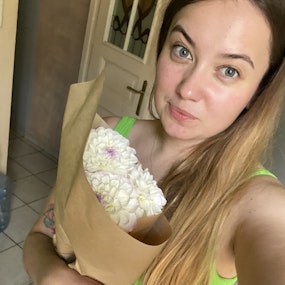
Olga Pylypchuk
Marketing expert
I’m Olga. I’m from Ukraine. Fro 12 years I’ve been living in Poland. I love traveling. I have a senior shelter dog. I love playing tennis. I love working on myself.



























